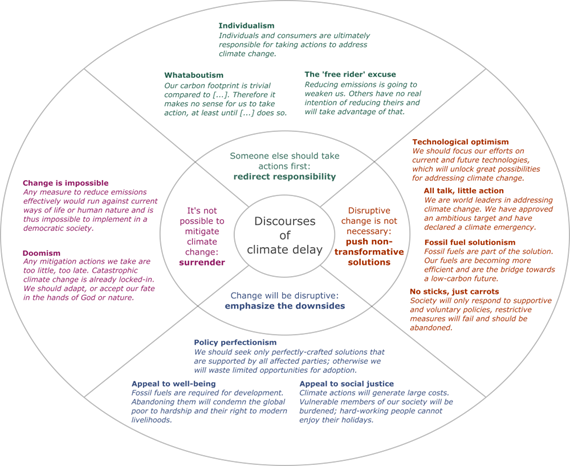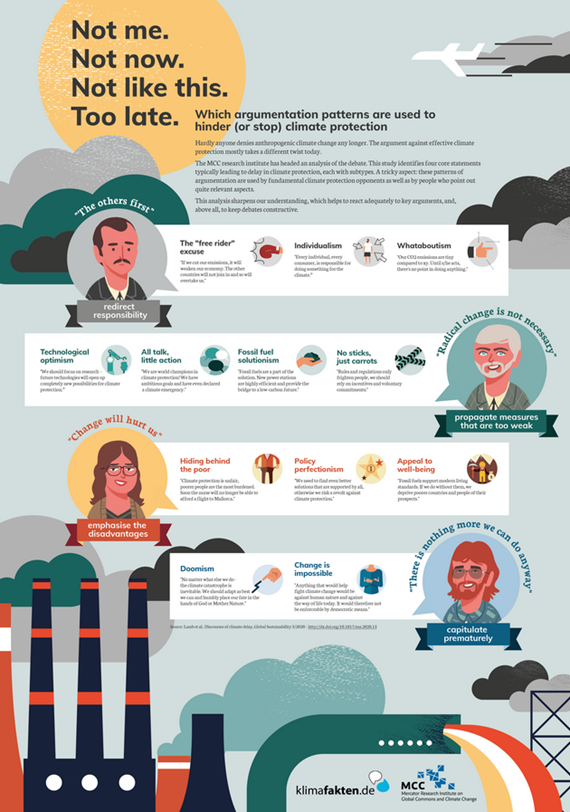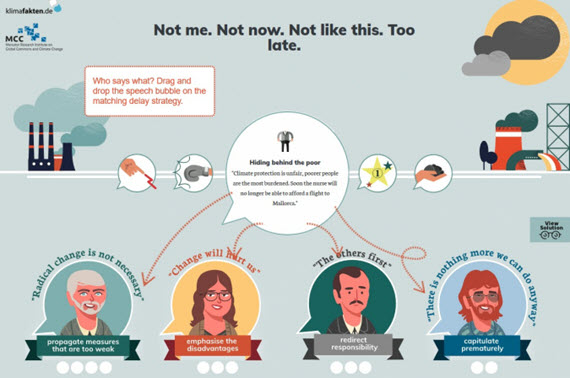Discourses of Climate Delay
Posted on 3 November 2021 by BaerbelW
This blog post combines extracts from articles published by our German language partner website klimafakten.de, one from September 2020 and another from January 2021. It'll be the start of a series of blog posts looking more closely at the various discourses of climate delay, an insidious way to keep delaying action to combat climate change now that outright climate science denial seems to be waning.
"Discourses of Climate Delay" is the title of a study (Lamb et al. 2020), which got quite some attention upon publication. You could also call these "climate cop-outs", excuses to not having to do much against climate change. A team from the Mercator Research Institute on Global Commons and Climate Change (MCC) in Berlin had analyzed often-heard delaying arguments and put them into a taxonomy.
They found four main categories:
Redirect Responsibilities: Someone else should take action first
Propagate non-transformative solutions: Mitigate without fundamental, disruptive changes - the "not like this" excuse
Emphasize the downsides of climate policy because it would be politically and socially unjustifiable.
Surrender: stating that it's too late and that a change of course is no longer possible.
Or shorter: "Not me, not like this, not now and too late"!
Figure 1: The Discourses of Climate Delay from Lamb et al. 2020 (click image or here for larger version)
Being able to identify these discourses of climate delay and in turn not falling prey to them will become a very important skill the more discussions turn towards solving the climate crisis. According to the team of authors, many variants of such lines of argument can be found in public debates - and the goal is always the same: delay. Although climate change is acknowledged as a fundamental problem, the need for and possibilities of action are downplayed. At the same time, insufficient climate protection measures are justified by referring to (alleged or actual) negative social or economic consequences of a more ambitious climate policy. As a result, the public is given the impression that unsolvable obstacles prevent immediate climate policy intervention. Scientists often observed this approach in connection with attacks on scientists or science per se.
The poster
Supported by Mercator Research Institute on Global Commons and Climate Change (MCC) and Communication agency FLMH the Klimafakten team converted the paper's findings into a large infographic depicting the twelve main climate cop-outs. It can also be downloaded from Klimafakten as a PDF file with low resolution (1,8 MB) and high resolution (11 MB)
Figure 2: English infographic (300dpi - 1,6 MB)
The game
In addition, a web-based game was developed with which you can test how good you are at spotting these excuses. The online quiz involves dragging speech bubbles with a total of twelve frequently heard statements on climate policy onto four figures. Each of these embodies a basic argumentation pattern: propagating measures that are too weak, emphasizing the (supposed or actual) disadvantages of climate protection instruments, passing on responsibility or capitulating prematurely to climate change. "Simply denying man-made climate change no longer works today," explains MCC researcher Lamb. "The debate is more subtle now."
Figure 3: Discourses of Delay - click on the graphic (or here) to play the game!
Why these claims are tricky
"The tricky thing is that there is always a grain of truth in all such claims," Lamb said when the study was published. "But these certainly relevant aspects of the climate debate often become instruments of an obstructionist strategy aimed at averting drastic measures and protecting material vested interests in the short term. This is why ambitious climate protection needs clear communication. Our study makes a contribution to this."
Have you happened upon examples of these kinds of arguments and if you did, how did you react? Let us know in the comments!































 Arguments
Arguments

































This article does seem insightful relative to personality type-castings and climate change results, but its implications leave the problem at the doorway of education or personality typologies and features. There are other approaches but they are less complementary to the species and its membership.
Another approach was used in a 1975-77 international project on environmental deterioration as a result of general human characteristics and a species attitude towards nature. It did not end in particulat personality profiles nor educational backgrounds and foregrounds.
The research began with concern in humans having a general distrust, even dislike, of nature and natural processes in psychology as measured in industrial processes. Nature was seen as implicitly systemic while humans prefered being seen as analytic. The analytic was shown to be reductionistic, segmented and absent of context, while having reverence for cause-effect conclusions as abstractions. Any reference to management as wrong in the longer-term, as comparied to factory workers proving to be more insightful, was said to be "ad hominem," whatever disbelievers, usually upper management but not CEOs, might mean each time they said such. This was endemic to the human approach to problems. In the research it was called legalism in search of finding a legal order.
The alternative posed from the research with twenty major international firms and six governments was a more natural, neogtiated order. This began in what had been learned in Prisoner's Dilemma with Rapaport. The three volume research conclusions appeared, with an ending with research from a participant on climate change if the human psyche did not find a paythway to appreciate the natural (Black was in the project). This approach to governance requied self-regulation of human relations to the environment, each other, and self.
In 1978 this was presented in a dissertation at the U of Pennsylvania. The cross-disciplinary professor-committee finally accepted it but asked for the "cimate-change" part be removed with more analysis as to why such was very questionable. They asked for traditional results that could be abstracted from "research details." They saw general systems thinking as anti-science? The Head of EPA was furious about the study and the dissertation, as was the Dean of the Wharton School. He saw no relation between environmental deterioiration and business. The author agreed, that dean did fail to see a relation, which made discussion more difficult. Forty years later the work was republished as "Too Early, Too Late, Now what?" A new chapter on this evolution will appear in Europe late this year which goes deeper into why its a human thing, not restricted to some types. That thesis is: "Short-term gain, Long-term pain." Its a very old story about a species with seroius limitations in its great ability to think.
[BL] You seem to be making a habit of referring back to the same old work (or similar), in nearly every comment you make.
In your very first comment here, you were warned that this is not a forum for you to do nothing but promote your book. Disguising such promotion by avoiding mentioning that it is your own work - if that is what you are doing - is not appropriate.
Also note that the Comments Policy advises against excessive repetition.
Discussion is welcome, but treating this site as a free source of self-promotion is not.
David Hawk. I dont understand what you are talking about. Could you please clarify your views in plain language and, without all the social science jargon and psychobable and without the confusing impenetrable ancient history about the dissertation.